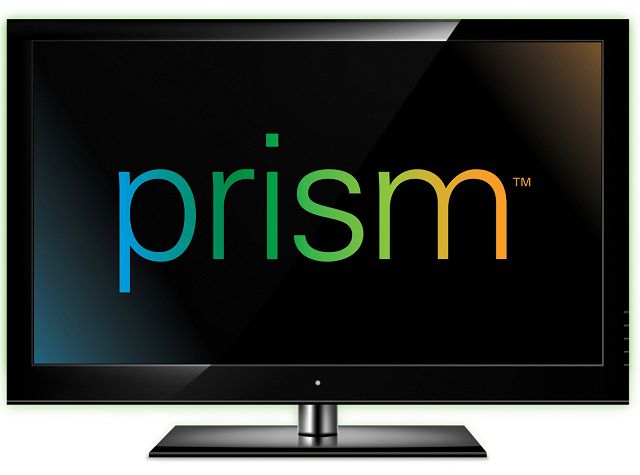 AT&T’s attempt to avoid oversight and enforcement of consumer protection laws by the Federal Trade Commission (FTC) failed in a federal appeals court Monday, overturning a 2016 decision that agreed with AT&T the FTC could not oversee or punish AT&T for its business practices.
AT&T’s attempt to avoid oversight and enforcement of consumer protection laws by the Federal Trade Commission (FTC) failed in a federal appeals court Monday, overturning a 2016 decision that agreed with AT&T the FTC could not oversee or punish AT&T for its business practices.
In a unanimous 11-0 decision by the Ninth Circuit Court of Appeals, the court found AT&T’s interpretation of a law it said gave the Federal Communications Commission exclusive authority to regulate and oversee “common carrier” telecom companies was overly broad and based on a misinterpretation of the law. The decision means the FTC will continue to pursue AT&T in court to secure relief for AT&T’s wireless customers that the FTC claims were misled by AT&T’s unlimited data plan that was not truly unlimited.
“The phrase ‘common carriers subject to the acts to regulate commerce’ thus provides immunity from FTC regulation only to the extent that a common carrier is engaging in common-carrier services,” the court ruled Monday. In laymen’s terms, the judges found that the FCC does have the regulatory authority to oversee common carrier services like basic telephone service, but the law does not prevent other government agencies like the FTC to oversee AT&T’s conduct in non common-carrier services.
The FTC and the FCC both argued that allowing AT&T and the 2016 lower court opinion to stand would create a regulatory loophole through which virtually any corporation with even the slightest ownership stake in a common carrier telecommunications company could escape all oversight and enforcement of consumer protection laws.
The dispute began in 2014, when the FTC sued AT&T in court for intentionally throttling wireless internet speeds of millions of AT&T customers hanging on to their legacy unlimited data plans.
The FTC’s complaint alleged that the company failed to adequately disclose to its customers on unlimited data plans that, if they reached a certain amount of data use in a given billing cycle, AT&T reduced – or “throttled” – their data speeds to the point that many common mobile phone applications – like web browsing, GPS navigation and watching streaming video – become difficult or nearly impossible to use.
 “AT&T promised its customers ‘unlimited’ data, and in many instances, it has failed to deliver on that promise,” said former FTC Chairwoman Edith Ramirez in 2014. “The issue here is simple: ‘unlimited’ means unlimited.”
“AT&T promised its customers ‘unlimited’ data, and in many instances, it has failed to deliver on that promise,” said former FTC Chairwoman Edith Ramirez in 2014. “The issue here is simple: ‘unlimited’ means unlimited.”
According to the FTC’s complaint, AT&T’s marketing materials emphasized the “unlimited” amount of data that would be available to consumers who signed up for its unlimited plans. The complaint alleged that, even as unlimited plan consumers renewed their contracts, the company still failed to inform them of the throttling program. When customers canceled their contracts after being throttled, AT&T charged those customers early termination fees, which typically amount to hundreds of dollars.
The complaint accused AT&T of violating the FTC Act by changing the terms of customers’ unlimited data plans while those customers were still under contract, and by failing to adequately disclose the nature of the throttling program to consumers who renewed their unlimited data plans.
AT&T responded in court asking the case be dismissed, arguing that the FTC could not bring a case against AT&T because, as a common carrier, only the FCC has jurisdiction over the company.
The case was largely decided on whether Congress intended to exempt common carrier companies from FTC oversight based on their “status” or their “activities.” AT&T argued the law clearly gave companies deemed to be common carriers a blanket exemption from FTC oversight. The FTC argued Congress only intended to exempt the specific common carrier “activities” or services sold by a company from FTC oversight, not the entire company. The three-judge panel of the Court of Appeals agreed with AT&T’s view, affirming AT&T’s claim it was untouchable by the FTC and dismissed the FTC’s lawsuit.

Judge Kozinski, questioning AT&T: “I’m regulated by the FTC and I don’t like it. I go out and I buy a small, money-losing common carrier. Do I say, ‘bye bye FTC,’ under your reading of the statute?”
The decision was a stunner in D.C. regulatory circles and opened a chasm-sized loophole for almost any company to completely escape the FTC’s oversight and enforcement of consumer protection laws just by providing a single common carrier service (or acquiring a small phone company that does) to secure blanket immunity. The FTC appealed the decision before the Ninth Circuit Court of Appeals.
Both the FTC and at least one judge hearing the federal agency’s appeal saw the potential impact of the earlier 2016 decision immediately.
“I’m regulated by the FTC and I don’t like it,” Judge Alex Kozinski said to AT&T’s attorney. “I go out and I buy a small, money-losing common carrier. Do I say, ‘bye bye FTC,’ under your reading of the statute?”
The FTC warned if AT&T’s view was upheld, any company could buy a common carrier and violate federal consumer protection laws with no recourse for consumers and no available FTC enforcement action.
This week’s decision, called “common sense” by the judge who wrote the summary of the court’s finding, restores the FTC’s authority over non-common carrier services at companies large and small, including AT&T. It is also a relief to FCC Chairman Ajit Pai, who earlier argued the FTC had jurisdiction over abusive ISPs and would effectively oversee broadband providers without any need to continue the net neutrality policies of his predecessor. Had the court ruled in favor of AT&T, Pai’s policy would have transferred oversight of internet services to an agency legally prohibited from overseeing most broadband providers.
The FTC was pleased with the decision.
“It ensures that the FTC can and will continue to play its vital role in safeguarding consumer interests including privacy protection, as well as stopping anti-competitive market behavior,” Maureen Ohlhausen, acting Chairwoman, said in an emailed statement.
AT&T was not, and claimed the court ignored the merits of the case.
“We are reviewing the opinion and continue to believe we ultimately will prevail,” the representative said in an emailed statement, which did not definitively state whether AT&T intended to appeal the decision.


 Subscribe
Subscribe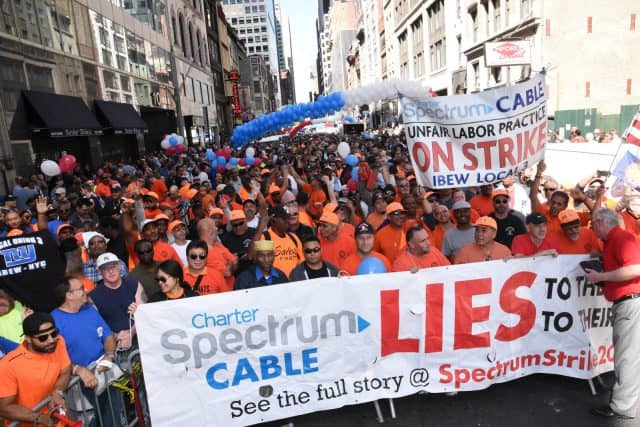
 “They basically said that until we agree that they don’t have to contribute to our pension and health plan, they won’t talk about anything else,” Chris Erikson, business manager of Local 3,
“They basically said that until we agree that they don’t have to contribute to our pension and health plan, they won’t talk about anything else,” Chris Erikson, business manager of Local 3,  Verizon has announced a wave of call center closures in several states that will results in layoffs, although some employees will be invited to reapply for their position if they are willing to move to another state or continue their work as a “Home Based Agent” taking customer service calls from a home office.
Verizon has announced a wave of call center closures in several states that will results in layoffs, although some employees will be invited to reapply for their position if they are willing to move to another state or continue their work as a “Home Based Agent” taking customer service calls from a home office. Although Spectrum customers can visit the order page to sign up for Spectrum Choice immediately, when we tested it this afternoon we found the website was not able to complete an order. It turns out Spectrum is initially “hand-selecting” about 100,000 customers in selected areas for Spectrum Choice, but won’t disclose exactly where those areas are. We know from some reviews, it is available in parts of Ohio.
Although Spectrum customers can visit the order page to sign up for Spectrum Choice immediately, when we tested it this afternoon we found the website was not able to complete an order. It turns out Spectrum is initially “hand-selecting” about 100,000 customers in selected areas for Spectrum Choice, but won’t disclose exactly where those areas are. We know from some reviews, it is available in parts of Ohio.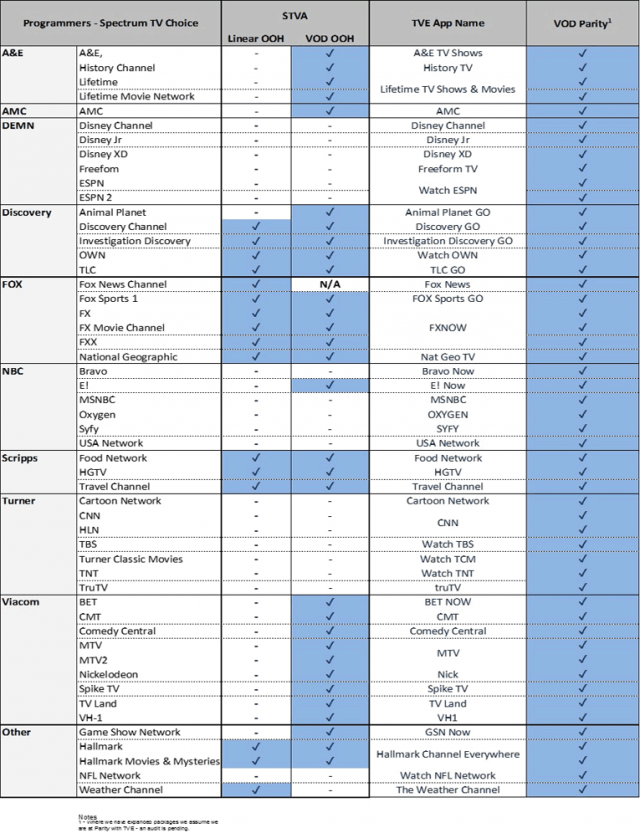
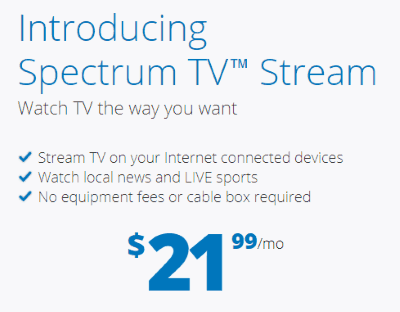
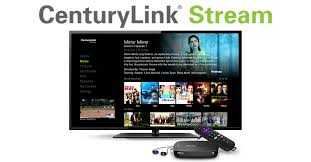 CenturyLink Stream, the phone company’s planned nationwide alternative to cable television, will shut down its streamed package of nearly 50 channels on March 31.
CenturyLink Stream, the phone company’s planned nationwide alternative to cable television, will shut down its streamed package of nearly 50 channels on March 31.